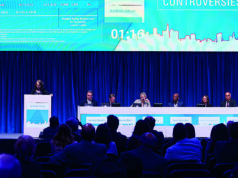
At the 2024 American Venous Forum (AVF) in Tampa, Florida (March 3–6), Glenn Jacobowitz, MD, professor of vascular and endovascular surgery at NYU Langone Health in New York City and 2023-24 AVF president, tackled the future direction of the society—and from where it has come.
Jacobowitz used his outgoing presidential address to outline plans to expand international outreach programs, increase diversity and equity amongst members, and focus on young venous specialists. He also stated that since it has been five years since the previous group retreat where the current AVF five-year plan was outlined, it is time to start looking ahead and what the next five years hold.
Jacobowitz participated in a retreat last year with former AVF President William A. Marston, MD, professor in the Division of Vascular Surgery at the University of North Carolina Hospitals in Chapel Hill, North Carolina, where there was a focus on making sure all persons have access to prevention and treatment options, improving on the current inequalities of venous care, and increasing access to understanding venous disease prevention and treatment.
Jacobowitz peered back into AVF history for help determining what its future should look like. “The AVF went through a brief time of financial stress and lower membership,” he told those gathered for the AVF 2024 address. “But our leaders identified a need to redefine our mission goals and align these goals in a way to expand our membership and diversify, and also restructure our management team and our strategic plan.
“We can’t have a myopic view of the world,” Jacobowitz told the audience. The AVF has partnered with 35 international societies “to increase collaboration, improve management of venous disease globally, leading to information exchange and joint project proposals, including guideline summaries, collaborative research, and education,” he added.
The AVF now has educational offerings around the world, including early training programs, webinars, and planned symposia in South America, Europe, Egypt and China. There are also international webinars, the first of which was viewed in over 60 countries and had more than 1,000 registrants. The plan is to hold them every three months, Jacobowitz said.
Jacobowitz also mentioned that the AVF recently established around $200,000 in annual grants. Those include the AVF-Jobst Clinical Research Grant ($85,000), AVF-BSCI Translational Research Grant ($85,000), AVF-NIH/NHLBI Grant ($25,000), AVF Basic Science Research Grant ($15,000), and the AVF Janssen Fellowship ($50,000).
In the new year, there will be “increased focus on young venous specialists,” Jacobowitz stated. “We have a record number this year.” He continued by mentioning the importance of advanced practice providers (APP) and the need to engage more with them to “help mitigate the equities of care.”
Jacobowitz issued a call to action on equity of care. “It’s a complex problem, a large problem, but it involves the disease process … we need to develop programs over hurdles, understanding this and the geographically and economically underserved,” he said.
He concluded by saying the AVF will “lead the way in venous care in the U.S. and abroad through our own initiatives and through collaborative work with our global partners and industry. All the while we’ll maintain focus on research, mentorship, education and advocacy.”












